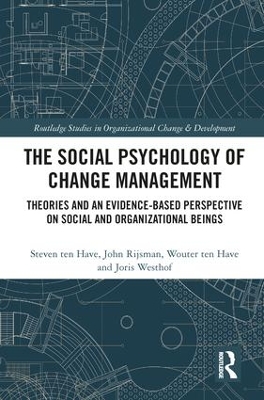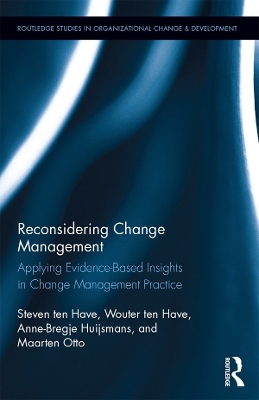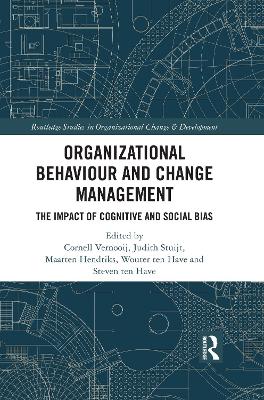Routledge Studies in Organizational Change & Development
4 total works
The Social Psychology of Change Management
by Steven Ten Have, John Rijsman, Wouter Ten Have, and Joris Westhof
Changes are rarely accomplished by individuals. People are social animals and changes are social processes which have to be organized.
Social psychology is essential for the effectiveness and development of the field of change management. It is necessary to understand people in change processes. Social psychology also teaches us that meaning is key during change and intervention. Social psychology makes change management comprehensible to people and allows them to consider their actions in groups and the organization on their merits. They may seem obvious and self-evident, but practice and science, as well as the popular change management literature, show that it is not.
Drawing on the field of social psychology and based on primary research, The Social Psychology of Change Management presents more than forty social psychological theories and concepts that are relevant for the field of change management. The theories and concepts are analyzed and categorized following Fiske’s five core social motives; belonging, understanding, controlling, enhancing self, and trusting. Each theory will have an introduction in which its assumptions and relevance is explained.
By studying the scientific evidence, including meta-analytic evidence, the book provides practitioners, students and academics in the field of change management, organizational behaviour and business strategy the most relevant social psychological ideas and best available evidence, thereby further unleashing the potential of social psychology in order to feed the field of change management. By categorizing and integrating the relevant theories and concepts, change management is enriched and restructured in a prudent, positive and practical way.
The overarching goal, however, inspired by the ideas and perspective of leading thinkers like Kurt Lewin, James Q. Wilson and Susan T. Fiske, is to make the world a better place. Social psychologists (being social scientists) study practical social issues, in our case issues related to change management, and application to real-world problems is a key goal. Therefore, this book goes beyond the domain of organizational sciences.
Change Competence
by Have Ten, Steven, Steven Ten Have, Wouter Ten Have, and Anne-Bregje Huijsmans
Organizations are often forced to change and adapt as a result of internal or external circumstances - whether the impetus is vision and ambition, a competing organization, societal pressure, or financial pressure. In this book, the authors posit that successful change requires the coherence of five elements: rationale and effect, focus and energy, and connection.
In Change Competence, they present a vision of change management centered around these five elements, along with a model and method for diagnosing, approaching, and developing change management in a purposeful way. The book demonstrates the nuances and applications of the change management model with the use of a single integrated case, from identifying elements ripe for change, to coping with barriers, to varying approaches to change, to the different leadership roles that emerge in relation to the five key elements of change management.
This book will be of interest to practitioners and students in change management, organizational behavior, and organizational development.
Reconsidering Change Management
by Steven Ten Have, Wouter Ten Have, Anne-Bregje Huijsmans, and Maarten Otto
Despite the popularity of organizational change management, the question arises whether its prescriptions and dominant beliefs and practices are based on solid and convergent evidence. Organizational change management entails interventions intended to influence the task-related behavior and associated results of an individual, team, or entire organization. There is a perception that a lot of change initiatives fail and limited understanding about what works and what does not and why.
Drawing on the field of psychology and based on primary research, Reconsidering Change Management identifies 18 popular and relevant commonly held assumptions with regard to change management that are then analyzed and compared to the four specific themes laid out in the book (people, leadership, organization, and change process), resulting in their own set of assumptions. Each assumption will have a brief introduction in which its relevance and popularity is explained. By studying the scientific evidence, in particular meta-analytic evidence, the book provides students and academics in the fields of change management, organizational behavior, and business strategy the best available evidence for the acceptance or dropping of certain (change) management assumptions and their accompanying practices. By exploring the topics people, leadership, organization, and process, and the related assumptions, change management is restructured and reframed in a prudent, positive, and practical way.



